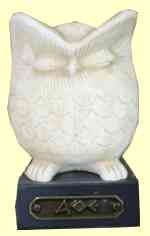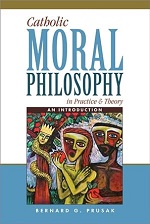
Philosophisch-ethische Rezensionen
(Erscheinungsdatum der rezensierten Bücher: 20. und 21. Jahrhundert)
- Aktuelle Rezension
- Rezensionen nach Autor
- Neueste Rezensionen
- Gästebuch
- Mail an Rezensenten
- Philosophenraten
Bernhard G. Prusak, Catholic Moral Philosophy in Practice and Theory: An Introduction, New Jersey 2016
In his introduction the author states that he wrote this book primarily for readers who live within the Catholic tradition. In
contrast to most other books reflecting over moral philosophy his approach is upside down: Prusak is not laying down a moral theory and then applying it to use and controvert
cases. He starts with a handful controversies and with these invites the reader to reflect. Each chapter ends, accordingly, with some questions which should help tightening and
reinforcing gained insights. The author‘s themes are the follow: Abortion, double-effect reasoning, just war and warriors, animal rights, kindney selling and human dignity and
conscience. His language is easy, considering that the cause is not really simple. In general he sets his points quite good. Although he fails to convince me of the pros of
double-effect reasoning which rather proves me to be a method of deforming
basic theses instead of reforming or correcting them. That conveyed a
bad impression on me. Thus e.g.
hysterectomy against uterine cancer is justified even when a woman is pregnant because, strictly speaking, the death of the fetus is here not intended but only forseen, whereas
e.g. in the case of a fetal craniotomy (likewise in order to save a woman's life in urgency) the death of the fetus is directly intended and thus strictly morally forbidden. The
author tries here to modify the argumentation so it should become more convincing and humanely, but this quite failed on me. His analysis of war, our relationship to animals and
organ trade seems me to be more reliable and justifiable. The chapter concerning conscience lacks completely modern psychological insights, but nevertheless may be of some help
for the interested reader. The author over and over again secures his points by means of traditional arguments (Thomas of Aquinas is a particular important point of reference),
but nonetheless sees the relevance of modern moral theory and enters into a quite fertile dialogue with it. Thus this introducion into catholic moral philosophy ends not with a
crash, but can be read with some prize, is understandable and at the same time intellectual appealing. However, as already perceptible in this book, the all and one catholic
moral philosophy does not exist and there are divergent catholic rivers of moral realizations and concepts, which nevertheless arise from a mutual spring.

![]()